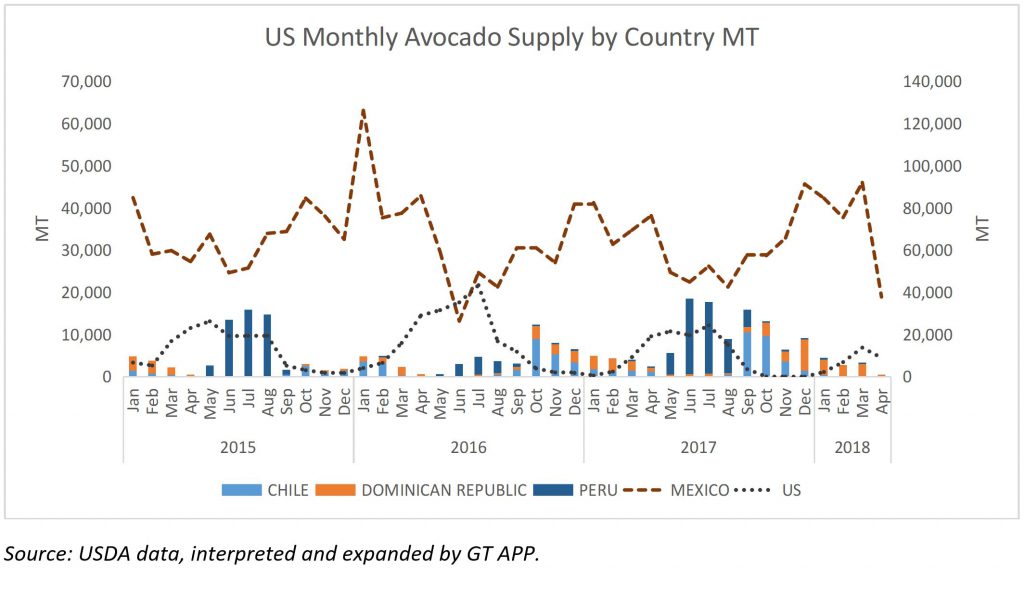In 2017, Mexican avocado production reached 753,589 metric tons, though this was down by 6 percent from the previous year due to bad weather. This disrupted the average year-to- year growth of 26 percent from 2012 to 2015, allowing for only a 2 percent increase for 2016.
In the high production month of December in 2017, production reached 91,420 tons, a 12 percent increase compared to 2016 and 40 percent increase compared to 2015—but not as high as January 2016 when it climbed to an all-time high of 126,293 metric tons.

For the 2016-17 season, Mexico experienced an alternate-bearing low crop and hard winter rain that lowered volume, except in December. Despite weather issues, Mexican production still managed to show an average growth rate of 11 percent per month from January 2014 to April 2018.
For the first quarter of 2018, Mexican production rose by 11 percent in January (84,691 metric tons) and 31 percent in March (92,133 metric tons)—with the latter recorded as the highest production month of the 2017-2018 season.
The United States produced 116,538 metric tons of avocados in 2017, representing 12 percent of total market supply. Unfortunately, this level has fallen, not so much due to rising Mexican production but to local drought conditions in California. For comparison purposes, in 2015 domestic production accounted for 25 percent of all avocados sold in the United States, and in 2012 this figure was even higher, at 32 percent.
Domestic production for 2017 was comprised of 87 percent Hass varieties from Southern California, and 13 percent from Florida producers of other green-skinned varieties.
California’s highest production months are May to July, while Florida typically reaches its highest production numbers from July to September. The last several years, California production has been reduced due to drought, with 2014 down 36 percent, 2015 down 9 percent, and 2017 down 37 percent.
Golden State production requires 74.1 gallons of water to produce 1 pound of fruit, while the global average of water usage per pound of avocados is markedly different at 28 gallons, although it varies by country: for example, Mexico is 31.9 gallons and Chile 96.8 gallons.
This is an excerpt from the most recent Produce Blueprints quarterly journal. Click here to read the full article.
In 2017, Mexican avocado production reached 753,589 metric tons, though this was down by 6 percent from the previous year due to bad weather. This disrupted the average year-to- year growth of 26 percent from 2012 to 2015, allowing for only a 2 percent increase for 2016.
In the high production month of December in 2017, production reached 91,420 tons, a 12 percent increase compared to 2016 and 40 percent increase compared to 2015—but not as high as January 2016 when it climbed to an all-time high of 126,293 metric tons.

For the 2016-17 season, Mexico experienced an alternate-bearing low crop and hard winter rain that lowered volume, except in December. Despite weather issues, Mexican production still managed to show an average growth rate of 11 percent per month from January 2014 to April 2018.
For the first quarter of 2018, Mexican production rose by 11 percent in January (84,691 metric tons) and 31 percent in March (92,133 metric tons)—with the latter recorded as the highest production month of the 2017-2018 season.
The United States produced 116,538 metric tons of avocados in 2017, representing 12 percent of total market supply. Unfortunately, this level has fallen, not so much due to rising Mexican production but to local drought conditions in California. For comparison purposes, in 2015 domestic production accounted for 25 percent of all avocados sold in the United States, and in 2012 this figure was even higher, at 32 percent.
Domestic production for 2017 was comprised of 87 percent Hass varieties from Southern California, and 13 percent from Florida producers of other green-skinned varieties.
California’s highest production months are May to July, while Florida typically reaches its highest production numbers from July to September. The last several years, California production has been reduced due to drought, with 2014 down 36 percent, 2015 down 9 percent, and 2017 down 37 percent.
Golden State production requires 74.1 gallons of water to produce 1 pound of fruit, while the global average of water usage per pound of avocados is markedly different at 28 gallons, although it varies by country: for example, Mexico is 31.9 gallons and Chile 96.8 gallons.
This is an excerpt from the most recent Produce Blueprints quarterly journal. Click here to read the full article.
Monica Gallo Riofrio earned an MBA from INCAE in Costa Rica and previously served as a price analyst. She is an agribusiness consultant and contributes her expertise to executive education programs.



